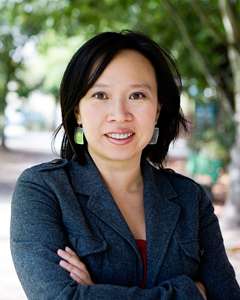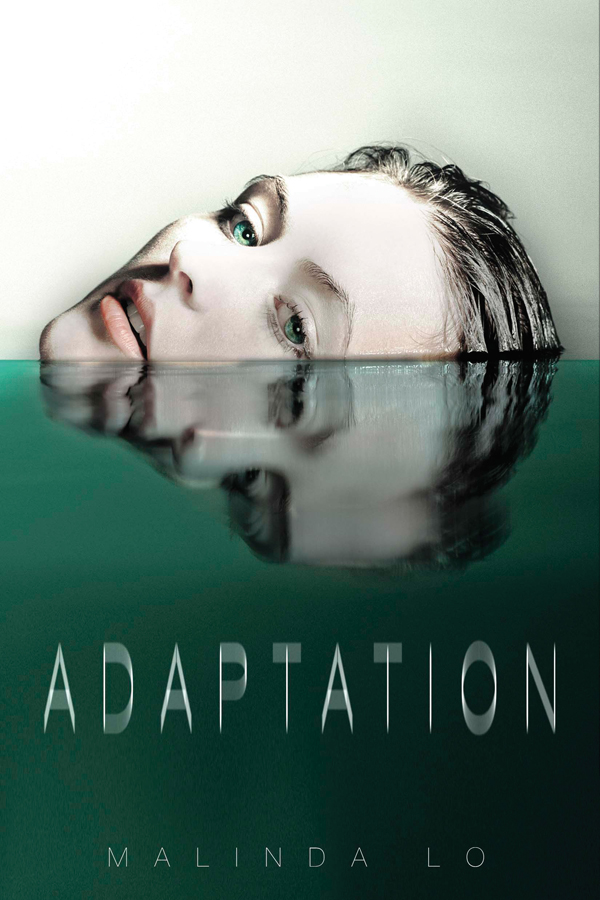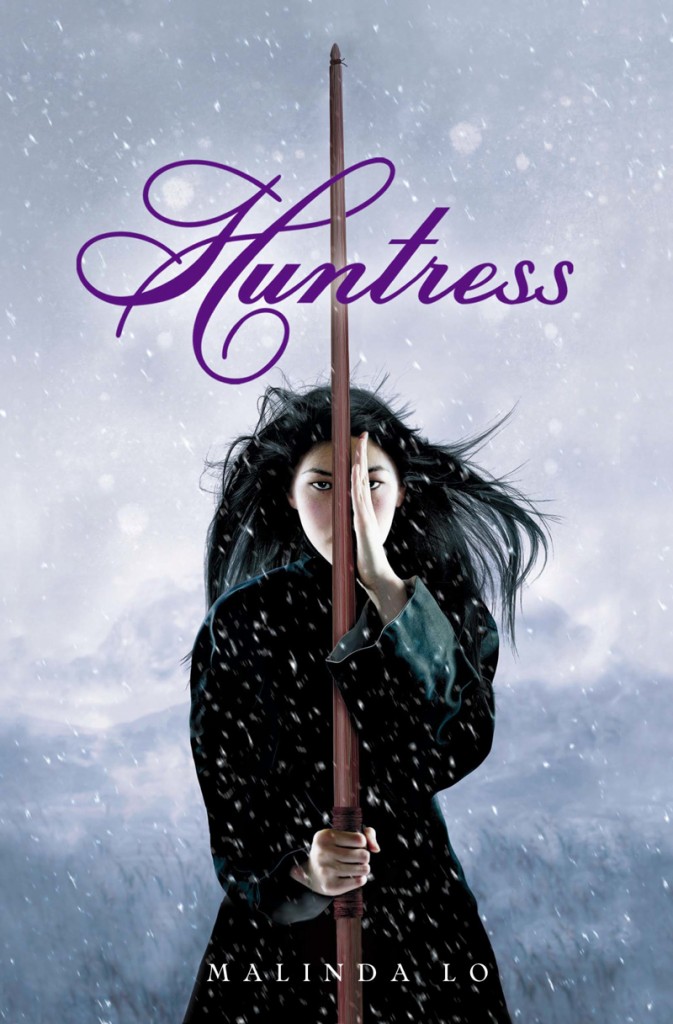 Regular visitors to our site will probably know that a few of us here are unabashed fans of good YA fiction, and we’ve been particularly fond of the books by Bay Area-based author Malinda Lo. In Ash, Lo brought us a beautifully reimagined Cinderella story; Huntress served as a prequel, deeply influenced by Chinese legends; her latest book, Adaptation, is a bit of a departure from the earlier two novels, a yarn of science fiction, conspiracy theories, and teenage love. In all of her novels, Lo has written compelling gay and straight characters, spinning their narratives with tender and attentive detail. Besides being a well loved YA author, Lo is quite active on Tumblr and is more than a bit of a geek. (Her graduate research at Stanford focused on The X-Files!) Basically, a woman after our hearts. To find out more about her writing process, her academic background, and which Hogwarts House would her three main protagonists belong to, read on for our interview! (Special note of thanks to Lois and Mace for contributing some excellent questions.)
Regular visitors to our site will probably know that a few of us here are unabashed fans of good YA fiction, and we’ve been particularly fond of the books by Bay Area-based author Malinda Lo. In Ash, Lo brought us a beautifully reimagined Cinderella story; Huntress served as a prequel, deeply influenced by Chinese legends; her latest book, Adaptation, is a bit of a departure from the earlier two novels, a yarn of science fiction, conspiracy theories, and teenage love. In all of her novels, Lo has written compelling gay and straight characters, spinning their narratives with tender and attentive detail. Besides being a well loved YA author, Lo is quite active on Tumblr and is more than a bit of a geek. (Her graduate research at Stanford focused on The X-Files!) Basically, a woman after our hearts. To find out more about her writing process, her academic background, and which Hogwarts House would her three main protagonists belong to, read on for our interview! (Special note of thanks to Lois and Mace for contributing some excellent questions.)
GQ: Let’s start with Adaptation. It’s fun genre fiction, but even more to me it read like a very believable coming of age story, regardless of the fantastical setting. How do you approach writing relatable teenage characters and what pitfalls, if any, do you try to avoid?
Malinda Lo: Thank you so much! I think that when writing teen characters, it’s important to not think of them as teenagers, but as people. I’ve spoken to writers before who have asked how they can get teen slang down, or how to make it sound contemporary, but honestly, that’s just thinking about teenagers like they’re some weird species to be studied. They’re human beings like the rest of us.
It’s also important to try to remember how you felt as a teen. The technology may have been different, but human experiences and emotions don’t tend to change that much. So: stop thinking about teens as “others.” Think about them as versions of your own experience.
 So have you gotten any reader responses from POC and/or LGBT teens that has validated your efforts?
So have you gotten any reader responses from POC and/or LGBT teens that has validated your efforts?
Oh yes, definitely! I’m always amazed when any readers write to me to say they enjoyed my books, and I’m even more amazed when they choose to share their personal experiences with me. I’ve heard from readers who say reading my books has helped them feel better about coming out, which is both rewarding and a little scary when I think about what they’re about to do. And I’ve heard from so many readers who say they like the fact that the characters in my books can be gay without being forced to deal with it as a problem. With Huntress, I’ve gotten email from readers who are confused by the Asian elements because they’re not familiar with them, but I’ve also gotten email from readers who are Chinese American and understand all those elements intimately, and they appreciate the book for not spelling it out like a tour guide. All these responses are fascinating to me, and also always appreciated.
What appeals to you about writing YA versus Adult Fiction? Do you feel that the distinction in these classifications is also become more blurred, with YA fiction broaching many weighty, mature topics?
I like the focus on story that is often found in YA. YA is full of plot and fast pacing and emotional intensity, which is fun to write and fun to read. Of course, there’s also plenty of adult fiction that is fast-paced and emotionally intense: thrillers, crime fiction, a lot of genre fiction. So ultimately, I think that YA is mostly a marketing category, and that category is currently focused on the age of the characters, and who the books are being sold to primarily (teens, but also school and public libraries).
From a business perspective, I understand the purpose of having this marketing category, but as a writer I find it somewhat irrelevant. I still think it’s best for the writer to write the book they want to write, and figure out how to market it once they’re finished.
As for YA taking on more mature topics, I think that YA has often taken on mature topics, but YA itself hasn’t always been such a popular category of fiction. So perhaps it’s partly a matter of more adults beginning to notice these kinds of YA novels, whereas in the past YA was largely ignored by the mainstream.
Building a present-ish day world with sci-fi elements (Adaptation) vs. a fantasy/fairy tale world (Huntress, Ash). Would you say you found one more challenging than the other?
Both have their own challenges, but I don’t think the challenges are because of the fantasy vs. contemporary worlds. I actually think Huntress was the most challenging of the books I’ve written because it’s a prequel to Ash, so I had to work within the confines of a world I’d already created before I knew I was going to write a prequel!
Adaptation and its sequel (Inheritance) were challenging in terms of the plot, which is kind of a big puzzle, but I really enjoyed that challenge. It was fun! I think the sequel to Adaptation came the easiest of all my books because I already knew the characters and the book’s tone was already set.
 So has your background studying Cultural and Social Anthropology helped with crafting your stories?
So has your background studying Cultural and Social Anthropology helped with crafting your stories?
It’s been extremely useful in terms of fantasy world-building! I mean, I spent years thinking very hard about how cultures work, how they change, what defines a culture, etc. So when it came time to invent some secondary fantasy worlds, I already had a framework to begin with. This is a little esoteric, but in grad school we studied the concept of “thick description“, a kind of ethnographic writing, and I remember purposely applying some of those methods to my fiction writing, particularly in describing the world in Ash.
You mentioned the response you got to the Asian elements in Huntress. We’ve been seeing more Asian-American writers take charge of their own cultural narrative recently, like in Prophecy by Ellen Oh, which is based on Korean folktales. What sort of encouragement would you pass on to them?
I think I’d tell other Asian American writers to write whatever the hell they want. If they feel moved to write about their ancestral cultures, that’s great — and I’d tell them to ignore all of mainstream culture that tells them those stories won’t sell. Basically, screw that and write what you want. But also, if an Asian American writer wants to tell a story about non-Asian Americans or non-Asian cultures, I totally support that, too. A lot of the time minorities are expected, rightly or wrongly, to represent for their communities. If you choose this, it’s wonderful. But to have others impose that kind of expectation on you is another kind of discrimination. Just as women writers can write about men, and vice-versa, Asian American writers are free to write about non-Asian Americans. And I think a lot of value can come from someone who is not in the majority writing about the majority.
You’re right about that expectation, for people to almost act as “ambassadors” at times. I can definitely say I’ve seen that burden of responsibility placed on many authors and bloggers I admire, especially in the social justice and media criticism corners of the web.
Speaking of blogs: you have an active one, where you often discuss tropes and industry standards. This sort of dialogue with readers and writers is something that can help foster a more thoughtful approach to media consumption. I know a blog is a blog, a personal thing, but do you have any particular hopes for what you’d like to see your readers take away from your posts?
I think I miss writing about pop culture at AfterEllen, and now that I’m not in grad school anymore I find theory a lot more interesting for some reason. So I love to get into it on my blog. It has the added benefit that I write only about what really intrigues me, and that’s a lot of fun.
I don’t see my blog as a personal thing, though. I see it as a public presentation, and these days I choose what I’m going to write about with the filter of “public” in mind. I don’t have a huge platform, but maybe I have a small-to-medium-sized one? And I want to use it to the best of my ability. So yeah, I definitely have hopes for what I’d like the public to take away from my thoughts.
Basically, in my fiction I try to always focus on the story; I don’t write to teach lessons. Nonfiction (blogging) allows me to write directly about culture, politics, and theory. That stuff is just fascinating to me as a former anthropologist. And honestly yes, I hope I change some people’s minds about gender, heteronormativity, and race. At the very least, I hope I can make some people notice their own assumptions.
In leveling some fair criticism about some trends in the industry/perception, etc. that could be improved, you still remain polite and very professional. Any tips for others out there who want to express criticism or analysis but not actually burn bridges?
Thank you! In the past I haven’t always been that way, and I hope I’ve learned from those mistakes. I certainly try, now, to make sure I write things with an open mind. Sometimes I slip into rant mode accidentally, but I do try to keep my rants private! It’s not that I think people shouldn’t have ranty opinions; it’s that I think being so aggressive in voicing one’s opinion can actually lead to shutting down real communication. I certainly have strong beliefs, but I no longer believe that yelling about them is always the right answer.
The reason I’ve changed my perspective on this is because of Buddhism. I know, religion! The truth is, I’ve been very profoundly affected by studying Buddhism for the past ten years. I’m not a model Buddhist by any means, but what I’ve learned has made me want to be kinder. I try to put that into practice every day — especially on the internet where it’s so easy to be a troll. I don’t always succeed, but I do try.
So my main tip to people who want to discuss controversial issues without burning bridges is to remember to be kind. The people you’re angry with are human, too.
That’s very straight forward but excellent advice. Alright, we’ve got a few fun closer questions for you. Name three books within your arm’s reach?
- Hold Still by Nina LaCour (a signed first edition that I was giving away on my blog)
- Welcome to Bordertown edited by Holly Black and Ellen Kushner (love them both!)
- Area 51: An Uncensored History of America’s Top Secret Military Base by Annie Jacobsen (research for Adaptation)
What three YA books do you especially love and would recommend to everyone?
- Unspoken by Sarah Rees Brennan: A humorous gothic fantasy with a girl detective. Loads of fun, and Sarah does funny so well. That’s so hard.
- Tripping to Somewhere by Kristopher Reisz: A gritty urban fantasy about two girls who run off to find the witches’ carnival, and have a dark romance with each other along the way.
- Fire by Kristin Cashore: My favorite of her three fantasies so far, about monstrous beauty.
And last, but most certainly not least, which Hogwarts House would you sort your three main characters into? (Ash, Kaede, Reese)
OMG this is the BEST QUESTION EVER!!
Ash would probably be in Ravenclaw. Kaede would obviously be in Gryffindor. And Reese…I think Reese would have a hard time deciding if she was Gryffindor or Slytherin. It’d be tough for her. :)
Thank you again for your awesome answers! We’re looking forward to Inheritance! The sneak peek at the cover photo shoot has us extra excited.
You’re welcome! Thank you for the interview!
Malinda Lo is the author of Ash, Huntress, and Adaptation. The follow-up book to Adaptation, Inheritance, will be available September 18, 2013 (Little, Brown Books for Young Readers). You can find Malinda at her website and follow her on Twitter @malindalo. For the listing of her upcoming appearances, check here.



Pingback: Adaptation | Queer Young Adult Literature